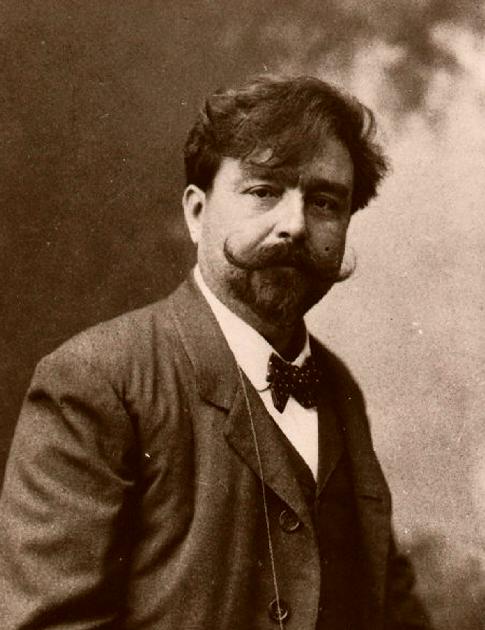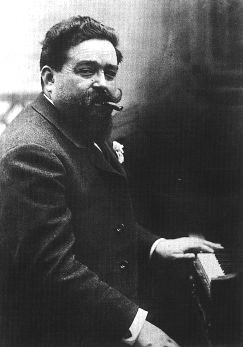<Back to Index>
- Astronomer Erwin Finlay-Freundlich, 1885
- Composer Isaac Manuel Francisco Albéniz y Pascual, 1860
- 1st Governor of Virginia Patrick Henry, 1736
PAGE SPONSOR



Isaac Manuel Francisco Albéniz y Pascual (29 May 1860, Camprodon – 18 May 1909, Cambo-les-Bains ) was a Spanish pianist and composer best known for his piano works based on folk music idioms (many of which have been transcribed by others for guitar).
Born in Camprodon, province of Girona, to Ángel Albéniz (a customs official) and his wife Dolors Pascual, Albéniz was a child prodigy who first performed at the age of four. At age seven, after apparently taking lessons from Antoine Marmontel, he passed the entrance examination for piano at the Paris Conservatoire, but he was refused admission because he was believed to be too young.
His concert career began at the young age of nine when his father toured both Isaac and his sister, Clementina, throughout northern Spain. By the time he had reached 12, he had made many attempts to run away from home. A popular myth is that at the age of 12 Albeniz stowed away in a ship bound for Buenos Aires. He then made his way via Cuba to the United States, giving concerts in New York and San Francisco and then travelled to Liverpool, London and Leipzig. By age 15, he had already given concerts worldwide. This over dramatized story is not entirely true. Albeniz did travel the world as a performer, however he was accompanied by his father. As a customs agent he was required to travel frequently. After a juxtaposition of Isaac's concert dates, on his alleged adventure, and his fathers travel itinerary it is apparent that they were traveling together. After a short stay at the Leipzig Conservatory, in 1876 he went to study in Brussels. In 1880, he went to Budapest to study with Franz Liszt, only to find out that Liszt was in Weimar, Germany.
In 1883, he met the teacher and composer Felip Pedrell, who inspired him to write Spanish music such as the Chants d'Espagne. The first movement (Prelude) of that suite, later retitled after the composer's death as Asturias (Leyenda), is probably most famous today as part of the classical guitar repertoire, even though it was originally composed for piano and only later transcribed. (Many of Albéniz's other compositions were also transcribed for guitar, notably by Francisco Tárrega — Albéniz once declared that he preferred Tárrega's guitar transcriptions to his original piano works). At the 1888 Universal Exposition in Barcelona, the piano manufacturer Erard sponsored a series of 20 concerts featuring Albéniz's music.
The apex of his concert career is considered to be 1889 to 1892 when he had concert tours throughout Europe. During the 1890s Albéniz lived in London and Paris. For London he wrote some musical comedies which brought him to the attention of the wealthy Francis Money-Coutts, 5th Baron Latymer. Money-Coutts commissioned and provided him with librettos for the opera Henry Clifford and for a projected trilogy of Arthurian operas. The first of these, Merlin (1898 – 1902) was thought to have been lost, but has recently been reconstructed and successfully performed. Albéniz never completed Lancelot (only the first act is finished, as a vocal and piano score), and he never began Guinevere, the final part.
In 1900 he started to suffer from Bright's disease and returned to writing piano music. Between 1905 and 1908 he composed his final masterpiece, Iberia (1908), a suite of twelve piano "impressions".
In 1883, the composer married his student Rosina Jordana. They had three children, Blanca (who died in 1886), Laura (a painter), and Alfonso (who played for Real Madrid in the early 1900s before embarking on a career as a diplomat). Two other children died in infancy.
Albéniz died on 18 May 1909 at age 48 in Cambo-les-Bains of Bright's disease, and is buried in the Cementiri del Sudoest at Monjuïc, Barcelona.
Alberto Ruiz-Gallardón, current mayor of Madrid, and Cécilia Sarkozy, the former wife of French president Nicolas Sarkozy, are two of Isaac Albéniz's great-grandchildren.
Albeniz's early works were mostly “salon style” music. Albeniz's first published composition, Marcha Militar, appeared in 1868 - a number of works written before this are now lost. He continued composing in traditional styles ranging from Rameau, Bach, Beethoven, Chopin and Liszt until the mid 1880s. He also wrote at least three zarzuelas, which are now lost. During
the late 1880s, the strong influence of Spanish style is evident in
Albeniz's music. In 1883 Isaac Albéniz met the teacher and
composer Felipe Pedrell. Pedrell was a leading figure in the
development of nationalist Spanish music. Gilbert Chase, in his book
The Music of Spain, describes Pedrell’s influence on Albéniz:
“What Albéniz derived from Pedrell was above all a spiritual
orientation, the realization of the wonderful values inherent in
Spanish music". Felipe Pedrell inspired Isaac Albéniz to write Spanish music such as the Suite española, Op. 47, noted for its delicate, intricate melody and abrupt dynamic changes. In
addition to the Spanish spirit infused in Albéniz’s music, he
incorporated other qualities as well. In Pola Baytleman’s biography on
Albéniz, she discerns four characteristics of the music from the
middle period as follows: “1. The dance rhythms of Spain, of which there are a wide variety. 2. The use of cante jondo, which means deep or profound song. It is the most serious and moving variety of flamenco or
Spanish gypsy song, often dealing with themes of death, anguish, or
religion. 3. The use of exotic scales also associated with flamenco
music. The Phrygian mode is the most prominent in Albéniz’s music, although he also used the Aeolian and Mixolydian modes as well as the whole-tone scale. 4. The transfer of guitar idioms into piano writing". Following
his marriage Albéniz settled in Madrid and produced a quantity
of music in a relatively short period. By 1886 he had written over 50
piano pieces.
The Albéniz biographer, Walter A. Clark, says that pieces of
this period received enthusiastic reception in the composer's many
concerts. Chase describes music from this period, “Taking the guitar as his instrumental model, and drawing his inspiration largely from the peculiar traits of Andalusian folk
music — but without using actual folk themes — Albéniz achieves
a stylization of Spanish traditional idioms that while thoroughly
artistic, gives a captivating impression of spontaneous improvisation... Cordoba is
the piece that best represents the style of Albéniz in this
period, with its hauntingly beautiful melody, set against the acrid
dissonances of the plucked accompaniment imitating the notes of the
Moorish guslas. Here is the heady scent of jasmines amid the swaying palm tress, the dream fantasy of an Andalusian “Arabian Nights” in which Albéniz loved to let his imagination dwell.” While Albéniz's crowning achievement, Iberia,
was written in the last years of his life in France, many of its
preceding works are well-known and of great interest. The five pieces in Chants d'Espagne, (Songs of Spain,
published in 1892) are a solid example of the compositional ideas he
was exploring in the “middle period” of his life. The suite shows what
Albéniz biographer Walter Aaron Clark describes as the “first
flowering of his unique creative genius”,
and the beginnings of compositional exploration that became the
hallmark of his later works. This period also includes his operatic
works - Merlin, Henry Clifford, and Pepita Jiménez. His orchestral works of this period include Spanish Rhapsody (1887) and Catalonia (1899). Albéniz’s
influence on the future of Spanish music was profound. His activities
as conductor, performer and composer significantly raised the profile
of Spanish music abroad and encouraged Spanish music and musicians in
his own country. In transcription, Albeniz's works have become an important part of the repertoire of the classical guitar. Asturias in particular is heard most often on the guitar, as are Granada, Sevilla, Cadiz, Cordoba and the Tango in D. Gordon Crosskey and Cuban born guitarist Manuel Barrueco have both made solo guitar arrangements of the full eight-movement Suite espanola. Selections from Iberia have
rarely been attempted on solo guitar but have been very effectively
performed by guitar ensembles, such as the performance by John Williams and Julian Bream of Iberia's opening "Evocation." The Doors incorporated "Asturias" into their song "Spanish Caravan"; and more recently, a guitar version of Granada functions as something of a love theme in Woody Allen's 2008 film Vicky Cristina Barcelona. In 1997 the Fundación Isaac Albéniz was
founded in his name to promote Spanish music and musicians and to act
as a research centre for Albéniz and Spanish music in general.